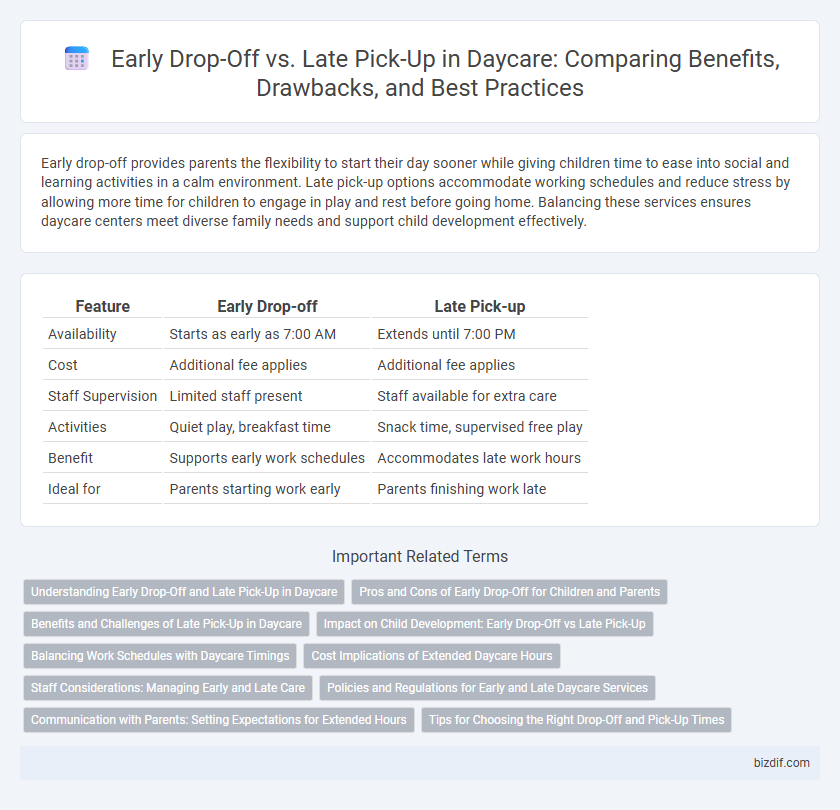Early drop-off provides parents the flexibility to start their day sooner while giving children time to ease into social and learning activities in a calm environment. Late pick-up options accommodate working schedules and reduce stress by allowing more time for children to engage in play and rest before going home. Balancing these services ensures daycare centers meet diverse family needs and support child development effectively.
Table of Comparison
| Feature | Early Drop-off | Late Pick-up |
|---|---|---|
| Availability | Starts as early as 7:00 AM | Extends until 7:00 PM |
| Cost | Additional fee applies | Additional fee applies |
| Staff Supervision | Limited staff present | Staff available for extra care |
| Activities | Quiet play, breakfast time | Snack time, supervised free play |
| Benefit | Supports early work schedules | Accommodates late work hours |
| Ideal for | Parents starting work early | Parents finishing work late |
Understanding Early Drop-Off and Late Pick-Up in Daycare
Early drop-off in daycare provides parents with flexible morning schedules while ensuring children engage in supervised, stimulating activities from the start of their day. Late pick-up services accommodate working families by offering extended care options that maintain consistent routines and social interaction for children beyond standard hours. Understanding the balance between early drop-off and late pick-up policies helps parents choose daycare programs that best support their family's logistical needs and their child's developmental well-being.
Pros and Cons of Early Drop-Off for Children and Parents
Early drop-off in daycare offers increased flexibility for working parents, allowing them to start their day sooner and reduce commuting stress. Children benefit from gradual socialization opportunities and a structured morning routine, which can enhance emotional security. However, extended hours may lead to fatigue and less personalized attention as staff resources might be spread thinner in the early hours.
Benefits and Challenges of Late Pick-Up in Daycare
Late pick-up in daycare provides parents with extended flexibility, accommodating unpredictable work schedules and reducing stress during busy evenings. However, it may lead to increased costs and fatigue for both children and staff, impacting the child's routine and overall well-being. Balancing these factors requires daycare centers to implement clear policies and support services to maintain quality care during late hours.
Impact on Child Development: Early Drop-Off vs Late Pick-Up
Early drop-off in daycare settings can influence a child's emotional security by reducing time for morning routines and bonding, potentially increasing stress and impacting social development. Late pick-up often extends exposure to group interactions, which may enhance social skills but can lead to fatigue, affecting attention and cognitive function. Balancing drop-off and pick-up times is crucial to support optimal emotional well-being and developmental outcomes in early childhood.
Balancing Work Schedules with Daycare Timings
Balancing work schedules with daycare timings requires careful consideration of early drop-off and late pick-up options to minimize stress for both parents and children. Choosing a daycare that offers flexible hours can accommodate varying work shifts, ensuring children are safely cared for without disrupting professional commitments. Prioritizing daycares with extended hours helps maintain a consistent routine, fostering child development while supporting parental productivity.
Cost Implications of Extended Daycare Hours
Extended daycare hours, such as early drop-off and late pick-up, often incur additional fees that increase the overall cost for parents. Many centers charge hourly rates beyond standard care times, reflecting staffing, facility usage, and administrative expenses. Families should evaluate these costs against their schedules to optimize affordability while ensuring consistent child supervision.
Staff Considerations: Managing Early and Late Care
Managing early drop-off and late pick-up requires careful scheduling to ensure adequate staff coverage without exceeding labor regulations or causing burnout. Staff must be trained to engage children in age-appropriate activities during these extended hours to maintain quality care and support developmental milestones. Proper allocation of resources and flexible staffing models help balance caregiver workload while meeting parents' needs effectively.
Policies and Regulations for Early and Late Daycare Services
Daycare centers establish clear policies and regulations for early drop-off and late pick-up to ensure child safety and staff availability, often requiring prior notice or additional fees for extended hours. These policies typically include specific time frames, consent procedures, and penalties for unauthorized early arrivals or late departures. Compliance with state licensing regulations mandates careful documentation and communication to align with staffing ratios and operational guidelines.
Communication with Parents: Setting Expectations for Extended Hours
Clear communication with parents about early drop-off and late pick-up policies ensures smooth daycare operations and child safety. Establishing specific time frames and associated fees helps set expectations and prevents misunderstandings. Regular updates through newsletters or parent meetings reinforce these guidelines and encourage cooperation.
Tips for Choosing the Right Drop-Off and Pick-Up Times
Selecting ideal drop-off and pick-up times in daycare requires balancing the child's routine and family schedule to promote consistency and reduce stress. Prioritize drop-off times that align with your child's peak energy and mood to ease separation anxiety, while choosing pick-up windows that minimize wait times and allow quality time at home. Communicating with daycare staff about your needs and observing your child's behavior can help fine-tune these times for optimal daily transitions.
Early drop-off vs Late pick-up Infographic

 bizdif.com
bizdif.com